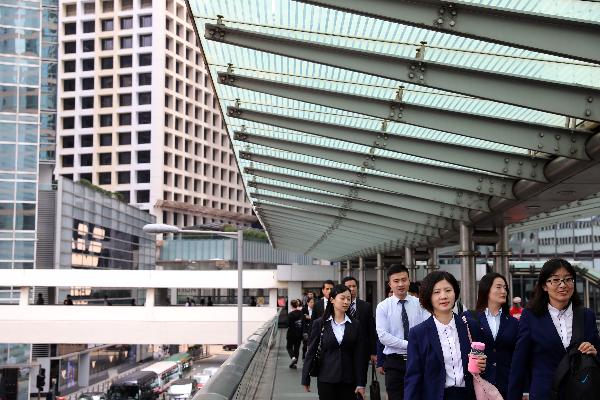
HONG KONG, Mar. 27, 2019 /Medianet International-AsiaNet/--Hong Kong small business confidence in the local economy, and growth expectations for 2019, has fallen to the lowest levels in the Asia-Pacific, according to new data from CPA Australia's 10th annual Asia-Pacific Small Business Survey.
The findings follow extensive surveying of 3,607 small business operators in Hong Kong, Mainland China, Taiwan, Malaysia, Vietnam, Indonesia, Philippines, Singapore, Australia and New Zealand.
Trade tensions weaken confidence
Gavan Ord, Manager of Business & Investment Policy at CPA Australia, says overall conditions for small businesses in Hong Kong were weaker, with 10 per cent fewer businesses reporting that they grew in 2018 than in 2017, compared with a two per cent fall across the Asia Pacific. These less positive conditions are likely to continue in the near future, with only 47 per cent of Hong Kong respondents expecting their businesses to grow in 2019 compared with the Asia-Pacific average of 68.8 per cent.
"Global trade tensions appear to be the primary reason for a general weakening in confidence, especially in Hong Kong, with 52 per cent of respondents forecasting that a global trade war could have negative impacts on their business in 2019, the highest level of concern among all markets surveyed in the Asia-Pacific.
"On the other hand, small business confidence is strongest in developing markets, with small businesses in the Philippines, Vietnam, and Indonesia having the most positive outlook for their businesses.
"With fast growing local economies, it is not surprising that small business confidence in those markets is very high. As small businesses in those markets are heavily focused on key drivers of business growth, such as technology, innovation and customer satisfaction, small business conditions in those markets are likely to remain very positive for some time to come.
"For businesses in Hong Kong, this strong level of confidence in Indonesia, the Philippines and Vietnam creates opportunities for growth and collaboration, especially with a challenging local environment."
Janssen Chan, CPA Australia's Deputy Divisional President and Chairperson of SME Committee in Greater China says the survey results show that Hong Kong small businesses are showing caution.
"Confidence in local economic growth over the next 12 months has dropped sharply to 29 per cent ¨C down by about 30 per cent from 12 months ago. This is also the lowest result of the surveyed markets.
"Only 47 per cent of respondents from Hong Kong expect their business will grow in the next 12 months, which is also the weakest result in the Asia-Pacific region. Reflecting this declining business confidence, respondents showed a conservative attitude to increasing headcounts and seeking external finance in 2018 compared with the results of the last survey.
"Increasing costs and competition are two major factors respondents identified as detrimental to small businesses in Hong Kong. As has been the case for many years, Hong Kong small businesses were the most likely in the Asia-Pacific to select rent as the cost most detrimental to their business.
"With Hong Kong's small business sector facing a challenging period, the government¡¯s announcement of increased support for the sector in the Budget is most welcome. Measures such as the extension of the geographical scope of the BUD Fund, an increase in the funding ceiling of the Technology Voucher Program and improving the SME Financing Guarantee Scheme, will all provide timely and effective support to small businesses in Hong Kong.
"The survey shows that 52 per cent of respondents believe accessing finance will be difficult in the next 12 months but according to my observation there has been an increase in applications to the SME Financing Guarantee Scheme since it has been announced. This should lead to small businesses having greater confidence in their ability to access finance," Janssen says.
Younger respondents are more positive about business growth
Although business growth sentiment in Hong Kong is generally down, the survey found that younger respondents (aged under 40) are more likely to state that their business is growing, creating jobs and focusing on key drivers of business growth ¨C including innovation, technology and exporting ¨C than respondents aged 40 and above.
Janssen stated "Younger respondents in Hong Kong are more willing to use technology in their business, from operations to sales, maintaining customer relations and better understanding customer behaviour. They are also more likely to invest in technology, such as software, mobile apps and websites, and that such investments are quickly improving their profitability.
"The survey also found that businesses focused on using technology and social media to better engage with and understand their customers are much more likely to be growing strongly. This is particularly so in developing economies, including the Mainland, Indonesia, Vietnam and the Philippines.
"Due to their typically stronger focus on technology, younger respondents are much more likely to expect a cyberattack in 2019 and are therefore more likely to have reviewed their cybersecurity measures in the last six months.
"The higher the uptake of technology, the more vulnerable the business is to cyberattacks. Small businesses in Hong Kong are actively protecting their systems, however, with 54 per cent of respondents having reviewed cybersecurity in the past 6 months, ranking third in the Asia-Pacific," Janssen says.
Amid lower business confidence, Hong Kong's small businesses are focusing more on cost control and enhancing customer loyalty. While this is an appropriate response to the current environment, these are more defensive actions by businesses rather than drivers of growth.
CPA Australia has suggested seven tips for Hong Kong's small businesses in 2019:
- Invest in developing your business's understanding of digital technologies so you can better use technologies such as social media, e-commerce and new payment technologies
- Seek advice on which technologies are best suited for your business and invest in those technologies
- Use data so that you can learn more about your customers to improve customer satisfaction
- Take advantage of government incentives that supports innovation
- Explore opportunities in the Greater Bay Area and other fast-growing ASEAN economies
- Invest in improving the strategic and management skills of your business
- Undertake a strategic review of costs and risks





















Latest comments